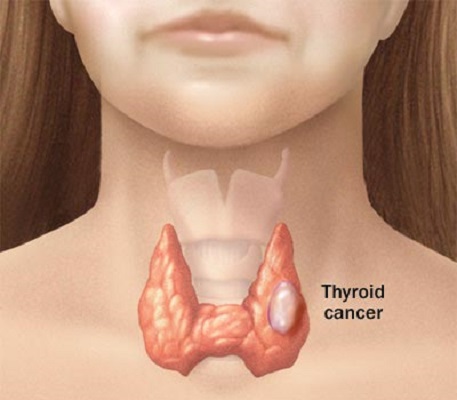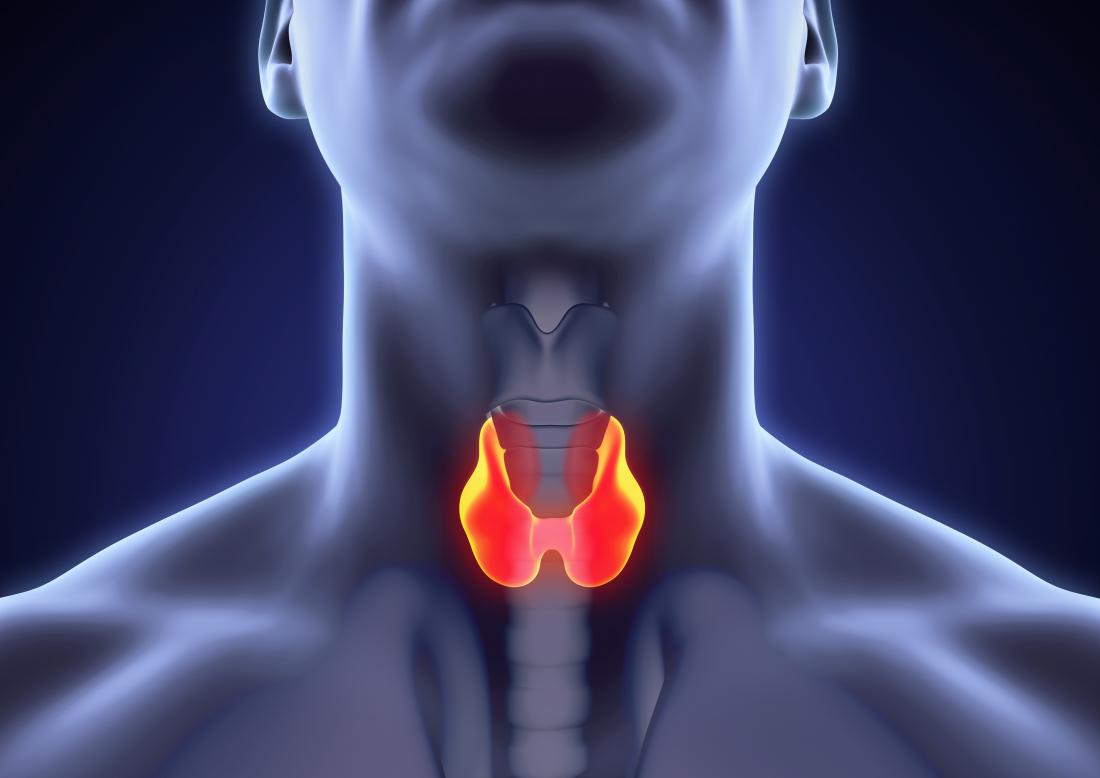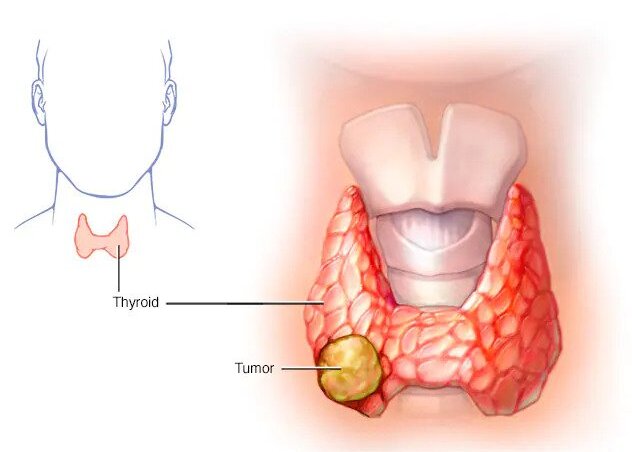Understanding Thyroid Cancer: An Overview with Stages
Thyroid cancer is the ninth most common cause of cancer worldwide in 2020, with 586,202 cases according to the World Cancer Research Fund International.
Detection of it is a matter of grave concern. However, with the advancement of technology in thyroid cancer treatment in India, the survival rates are also increasing.
Let me introduce you, one of our patients, Christy from Cape Town, South Africa.
Christy is a 38-year-old working woman recently married. Christy’s husband is very caring and supportive. Christy’s dream is to have a world tour with her husband.
Three years back, Christy felt she had lost her taste buds and found difficulty in swallowing the food. She was also having neck pain. She visited the doctor for a check-up with her husband.
The doctor examined Christy’s throat and suggested she do a blood test to check thyroid functioning and an ultrasound. The next day, the doctor called Christy to come and meet. The doctor informed Christy about the presence of a solid nodule in her thyroid and suggested doing a CT scan.
Christy did the CT scan, and thyroid cancer was confirmed. The doctor suggested she consult an ENT oncologist.


After listening to the news of cancer, Christy and her husband Dave were both in shock. Dave supported Christy and told her we would get the best treatment.
Dave, while researching for the best treatment for thyroid cancer, came across the MedicoExperts website and left his inquiry for her wife.
The MedicoExperts team got in touch with Dave and explained to him about the Tumor Board approach for thyroid cancer treatment, and also arranged an online video consultation with the ENT oncologist doctor.
During the video consultation, the doctors explained the treatment protocol and cleared all the doubts regarding the treatment.
Dave and Christy, after understanding all the aspects of treatment, decided to come to India for treatment.
After 15 Days, Christy and Dave both came to India and on the same day, Christy got admitted to the hospital.
An evaluation test was performed to check the current condition of thyroid cancer. The report suggested it’s slow-growing in one part of the thyroid and no suspicious nodules in other areas of the thyroid.
So the surgical oncologist decided to do a thyroid lobectomy, in which the surgeon removes half of the thyroid. After the surgery, radiation therapy was given.
A re-evaluation test was performed to check the outcome of the treatment, and no cancer was detected.
Both Christy and Dave were very happy and thanked the doctors and the MedicoExperts team.
This can be your story as well to win the battle against thyroid cancer. What you need is the right guidance, right treatment at the right time from the experts.
Before we start the discussion on different treatment options for thyroid cancer, let’s understand what it is.

It occurs in thyroid cells, a butterfly-shaped gland at the base of the neck, right under Adam’s apple. Your thyroid is a gland that regulates your heart rate, blood pressure, body temperature, and weight.
It may not cause symptoms when it starts. However, as it grows, it may cause pain and swelling in the neck.
There are different kinds of thyroid cancer. Some of them develop very slowly, and some of them can be very aggressive. Most people who suffer from this kind of cancer can be treated.

The tumor is 2 centimeters (cm) or smaller (less than an inch wide) and has not extended beyond the thyroid. It has not metastasized to nearby lymph nodes or distant sites.
The cancer meets either of the following criteria:
- The main tumor has a diameter of 2 to 4 cm. There is no evidence of cancer cells in regional lymph nodes or distant sites in the body.
- The primary tumor is larger than 4 cm in diameter or has begun to extend outside the thyroid gland. No lymph nodes or other areas of the body have shown signs of malignancy.
The cancer meets either of the following criteria:
- The original tumor is more than 4 cm in size or has grown outside the thyroid, but it has not metastasized (differentiated tumors alone) to adjacent lymph nodes or elsewhere.
- The tumor can be any size and located outside the thyroid, spreading to lymph nodes in the neck but not beyond.
- Understanding the staging of it is crucial for accurate diagnosis and treatment planning.
Stage 4 Metastatic Thyroid Cancer:
Metastatic thyroid cancer is the most advanced stage, indicating the spread of cancer beyond the thyroid gland. About 30 percent of these are diagnosed after the cancer has reached regional lymph nodes. In rare cases, around 3 percent, the cancer may spread to distant sites or organs.
Metastatic thyroid cancer stages are categorized based on the extent of spreading:
- Stage 4A: Cancer has extended beyond the thyroid gland and may infiltrate nearby tissues or lymph nodes in the neck and upper chest, but not distant sites.
- Stage 4B: The primary tumor has invaded the spine or nearby large blood vessels. At this stage, cancer may or may not have reached lymph nodes but has not spread to distant sites.
- Stage 4C: Thyroid cancer cells have metastasized to distant sites.
Stage 4 Anaplastic Thyroid Cancer
Anaplastic thyroid cancer, which is highly aggressive, is considered stage 4 regardless of its subtype:
- Stage 4A: The thyroid gland is the site of the original tumor, which may have migrated to adjacent lymph nodes but not to distant organs.
- Stage 4B: The tumor has migrated beyond the thyroid gland, and cancer cells may or may not exist in localized lymph nodes, but distant areas are untouched.
- Stage 4C: The cancer cells have moved on from the thyroid gland and into other organs and tissues further afield.
Thyroid cancer cells can metastasize to various locations through the lymphatic system or bloodstream. The most common sites of thyroid cancer metastasis include the lungs, bones, liver, and brain.
Frequently Asked Questions (FAQs):
Q1. What if I lose my voice while doing the surgery?
A. You won’t lose your voice. Hoarseness or changes will occur after the procedure that can be recovered within 6 months. If it goes beyond six months, voice therapy could be performed. The potential for permanent nerve damage is only about 1%.
Q2. What to expect after thyroid surgery?
A. The majority of people who have thyroid surgery will feel better in 1–2 weeks, but some people may take longer.
You will most likely spend one or two nights in the hospital after thyroid surgery to recover. Stitches, adhesive strips, or small clips will be used to close your neck wound.
Your nursing team will discuss how to care for your surgical wound site once you return home to avoid infection. Blood tests may be ordered by the surgeon to monitor your recovery.
You will also feel:
- Sore Neck: You will most likely experience some discomfort or pain where the cut was made. To help you cope, you’ll be given painkillers.
- Hoarse Voice: Thyroid surgery can sometimes affect the nerves that control the voice box, causing your voice to sound hoarse or weak. This is usually only temporary and gets better over time.
- Eating and Drinking: Most people start eating and drinking within a few hours after the operation.
- Painful Swallowing: You will find it painful to swallow for a few days.
Q3. Will I need to follow a special diet after thyroid surgery?
A. After a thyroidectomy or thyroid lobectomy, most people don’t need to follow a special diet. The morning after your surgery, you should be able to eat and drink normally, though you may prefer softer foods at first. We’ll tell you whether or not you need to restrict your eating and drinking, and for how long.
Next in Thyroid Cancer

Author Bio:
Dr. Yashashree Joshi – MBBS, MD (Philippines)
Dr. Yashashree Joshi, MD, is a globally-trained oncologist with a robust academic background and extensive experience in pioneering cancer treatments. Dedicated to patient-centered care, she continually integrates the latest advancements in oncology to provide her patients with innovative and personalized treatment plans.
Content Medically Reviewed By MedicoExperts Editorial & Clinically Review Board




